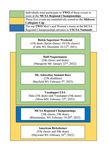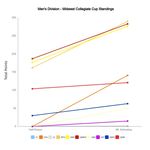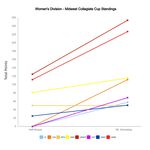MCSA Midwest Collegiate Cup: Mt. Ashwabay Summit Skiathlon
←
→
Page content transcription
If your browser does not render page correctly, please read the page content below
MCSA Midwest Collegiate Cup: Mt. Ashwabay Skiathlon Results
by Luke Dykowski
2/6/2022
MCSA Midwest Collegiate Cup:
Mt. Ashwabay Summit Skiathlon
St. Olaf makes Cup debut; MTU Men take Cup lead
The Midwestern Collegiate Ski Association (MCSA) conducted its second race of the 2021-22
season this weekend, with a record-breaking field taking to the trails in snowy Bayfield, Wisconsin.
Saturday’s unique skiathlon format and tumultuous weather marked a sharp departure from the Half-
Noquemanon, with athletes braving blizzard-like conditions and a formidable race structure in the chase
for the Midwest Collegiate Cup.
While many Cup events score skate and
classic disciplines separately, allowing skiers to
compete in whichever technique best suits them, the
Mt. Ashwabay Summit Skiathlon combines both
disciplines into a single race. After beginning with
approximately 10k of classic skiing, competitors
switch equipment mid-race, and finish with roughly
15k of skating. This format therefore requires mastery
of both techniques, an efficient transition, and
considerable stamina, as both the classic and skate
portions include grinding climbs to the eponymous
Mt. Ashwabay Summit.
Saturday’s conditions only added to the
demanding nature of the race. With temperatures
hovering around 7˚F, driving snow, blustery winds,
and a humidity approaching 90%, “cold and wet”
were the adjectives of the day – readily attested to by
fluctuating wax effectiveness on-course, and a parade
of frozen eyelashes, frost-nipped noses, and icicled
beards, eyebrows and ears at the finish line.
However, the weather was certainly no bar to
an unprecedented MCSA turnout. Fresh off the heels
of a landmark showing at the Half-Noque, eighty-
seven athletes across eighteen teams (joined by ten
skiers from the College of Saint Scholastica, not
registered with the USCSA) competed in Saturday’s
Top: The University of Minnesota – Twin Cities team blistering battle in Bayfield. Among them were league
celebrates with Mt. Ashwabay’s famous pie awards. Photo debutants Carleton College, Luther College, and the
courtesy of Lily Den Hartog. University of Notre Dame, as well as the College of
Bottom: The MCSA Women start in the shadow of the Mt. St. Olaf – a longtime member of the USCSA making
Ashwabay Summit. Photo courtesy of Oliver Tullio.its first appearance on the Midwest Collegiate Cup circuit.
New teams and skiers brought a new shape to the Cup chase. While the University of Minnesota
- Twin Cities Women narrowly expanded their Cup lead, Michigan Technological University surged to
the head of the Men’s standings – pushing the University of Minnesota - Twin Cities Men out of the top
spot for the first time in league history.1 Meanwhile, St. Olaf lunged into the top five in both the Men’s
and Women’s standings, as did the University of St. Thomas Women.
Mt. Ashwabay Skiathlon Breakdown
Leading the Women’s 25k Skiathlon by nearly Division, with victories at the Half-Noque and
two minutes, Erica Meyers (CSO) made her Mt. Ashwabay pushing their cumulative score to
dramatic Collegiate Cup debut with a finishing 254 points. Although the Twin Cities Women
time of 1:38:56. She was followed by Katie slightly expanded their lead on Saturday,
Susong (UWM), whose 1:40:39 secured her first University of Wisconsin - Madison Women
MCSA podium finish, and Kaia Hilgendorf- remain in hot pursuit with 227 points.
Roost (UMNTC), who finished in 1:44:37, and Competition is even tighter in third place: the
who was also third in the Half-Noque 24k Skate. University of Minnesota - Duluth Women (116
points) are only barely ahead of the College of
In the Men’s 25k Skiathlon, the podium was St. Olaf Women (112 points), whose strong
even more similar to the Half-Noque 24k Skate. showing in Bayfield launched them into the thick
Henry Campbell (MTU) repeated his Superior of the hunt for the Cup.
Dome success with a commanding return to the
top spot, crossing the line in 1:22:11. Ethan True to predictions, Saturday brought an exciting
Anderson (UMD), second in Marquette, shakeup of the Men’s Division. After the Half-
returned to Campbell’s right on Saturday and Noque, a mere 25 points separated first and third
finished in 1:26:22. He was closely followed by a place. Now, that spread has shrunk to 13 points
fresh face on Cup circuit: Brian Olson (CSO), – and, for the first time in three years, the
with a time of 1:26:56. University of Minnesota - Twin Cities Men
(283 points) have slipped from the top spot. Hard-
Turning to Mt. Ashwabay team standings, it was charging races from H. Campbell and J. Hudrlik
a beautif’ole afternoon in Bayfield for the pushed Michigan Technological University
College of St. Olaf. Led by Olson, the Oles won Men (290 points) from third place into the lead
the day in the Men’s Division with 141 points, by only 6 points; the University of Minnesota -
and were third in the Women’s Division with 112 Duluth Men (277 points) fell to third place and
points (despite fielding only three skiers). Close remain behind the Twin Cities. However, led by
behind the Ole Men came Michigan E. Anderson and E. Donohue, the Bulldogs have
Technological University (128 points) and the narrowed their gap from the Gophers to only 7
University of Minnesota - Duluth (100 points). points. Meanwhile, the College of St. Olaf Men
In the Women’s Division, the University of (141 points) rocketed into fourth place, pushing
Minnesota - Twin Cities took home another the University of Wisconsin - Madison Men
win, scoring 129 points. As in Marquette, the (121 points) into fifth. Although far from the
University of Wisconsin -Madison took second, podium at present, a further leap from St. Olaf is
with 115 points. hardly out of the question: three out of five
In the Midwest Collegiate Cup standings, the Midwest Collegiate Cup events remain, and
University of Minnesota - Twin Cities Saturday demonstrated the Oles’ capacity to put
maintained its position at the top of the Women’s substantial margins on the Cup’s current leaders.
1
See p.4 of the 2019-20 Northern Division recap and p.5-6 of the 2020-21 MCNL recap.Above: Mt. Ashwabay Team Standings, 2/5/2022. Calculated using the Mathie-Halvorson Scoring System. Above: Midwest Collegiate Cup Standings, 2/5/2022. Calculated using the Mathie-Halvorson Scoring System. Note the Half- Noquemanon scoring error correction.
Above: Midwest Collegiate Cup Standings, 2/5/2022. Calculated using the Mathie-Halvorson Scoring System.
From the Athletes
A robust college field, fierce competition, and especially Mt. Ashwabay’s famous home-baked pie-
zes seemed to define Saturday’s race in the frozen eyes of the MCSA skiers. Nathan Bich (4th place, leading
scorer for the UMNTC Men) offered a succinct summary of the event, noting that although it was “a wild
experience racing in a blizzard,” he had “a great time competing […] especially with free pies to look
forward to at the finish.” UMD President Ethan Anderson (2nd place, leading scorer for the UMD Men)
agreed, writing that the combination of the skiathlon format, the designated college start wave, and the pie
awards makes Mt. Ashwabay one of his favorite races. The UMD Men’s performance certainly added to
Anderson’s satisfaction: he reported that “It was really cool to see our team find success in edging out
UMNTC with only five of our skiers after a close loss at the Noque,” and that UMD is “really looking
forward” to another round of racing at the
Vasaloppet USA.
Saturday’s weather and double-summit
course weighed heavily on athletes’ assessment of
their races. Katie Susong (2nd place, leading scorer for
the UWM Women) found that “conditions were a bit
challenging but coming from Madison it was exciting
to see some fresh falling snow.” Having previewed
the course the day before, Susong knew that the
terrain would “require a steady sustained effort,”
particularly with “very few places to rest in the first
half of the loop.” Focusing on “keeping [her]
technique smooth and getting the most out of each
Above: Katie Susong poses proudly with a post-race pie.
stride” was the key to Susong’s first MCSA podium,
Photo courtesy of Sam Hagedorn.
who wrote that she had “a great race […] frozeneyebrows and all.” In contrast, Erica Meyers (1st place, leading scorer for the CSO Women) broke away
from the Women’s start “without any detailed knowledge of the course,” which made her “a little nervous
to attack those unknowns alone.” Catching the Men’s field, and briefly being caught by Susong during the
classic leg, made it “easier to see where [she] was going and figure out [her] pacing” – and Meyers enjoyed
racing, talking, and transitioning with her UWM counterpart before breaking away during the skate.
Although “the pouring snow made the transition and skate portions a bit of a slog, and the chilly temps”
left everyone with “icicles on their faces and sunglasses,” Meyers said that she “tend[s] to enjoy adverse
conditions” and that “it was a super fun race and experience.”
Micah Strike, scoring for the Carleton College Women, assessed the race’s layout and weather as
a demanding but rewarding debut for Carleton’s team. “For many of our skiers it was our first 25k, and a
challenging one at that due to the very snowy conditions,” Micah wrote – “but [it was] also a great success
in that we all survived, and I’m excited for the next one!” Racing his first MCSA event, UMNTC scorer
Isaac Maruyama also found that returning to competitive skiing, as well as the skiathlon format, made
Saturday “a blast.” Although “the new snow made for
slower-than-normal conditions,” he was “more than
happy” to “rely more on endurance than my skate
technique,” and was pleased to finish “neck-and-neck
with another friend [Eric Wurst] from the team.”
The University of Notre Dame also made
their first appearance on the Collegiate Cup Circuit at
Mt. Ashwabay, with the day’s challenges well-
balanced by camaraderie. UND Co-President Jacob
Novitch reported that “the cold and snow certainly
made conditions tough, but we enjoyed skiing at a
new venue and against other club skiers, many of
whom we knew from high school racing.” Even given
the long haul from South Bend, Novitch found the
event was “definitely worth the drive.” MTU
President and Men’s winner Henry Campbell was also
struck by the breadth of Saturday’s club field. “It was
awesome to see all of the club collegiate skiers lined Above: University of Notre Dame skiers Joe Theunte and
up at the start area,” Campbell said. “Every person Jacob Novitch, alongside brother Caleb Novitch
from our club knew at least one other skier from a (Michigan Technological University). Photo courtesy of
different team.” Mt. Ashwabay was a powerful Jacob Novitch.
demonstration of the MCSA’s unique ability to enable Below: The University of Minnesota – Duluth Men’s
“students continue to ski competitively against former team and their tasty award.
teammates, siblings, and friends made through the
league itself.”
Indeed, the sight and significance of nearly a
hundred college uniforms charging off the start line
was not lost on Race Director Scott Nesvold, who
hosted the MCSA during its inaugural 2019-20 season
and enabled the league’s return to Mt. Ashwabay after
dangerous cold canceled the 2021 race. Via email,
Nesvold extended his thanks to the colleges for their
participation. “We had by far our biggest group of
[skiathlon] skiers ever, and probably one of our biggestturnouts for the race!” he wrote. “It was great to see so many skiers enjoying the good snow (well, it might
have been pushing too much – but as a skier I won’t admit that) and beautiful trails. Hopefully they enjoyed
the baked goods as well.” If the above comments are any indication, it appears those hopes were certainly
well-founded.
Looking Ahead
Three events in as many weekends lie ahead for the MCSA, and the current Cup standings promise
intense competition between old rivals and ambitious newcomers. While the Vasaloppet USA (February
12th), MCSA Regional Championships (February 19th-20th), and American Birkebeiner (February 26th) will
all score towards the Midwest Collegiate Cup, the MCSA Regional Championships alone will determine
which teams attend the USCSA National Championships in Lake Placid, New York.
Reflecting on the Men’s standings shakeup, MTU’s Campbell wrote that the Huskies “have done
more training as a group this year than any year in the past,” including under the direction of “local legend
Tom Wood,” and that this structure “generates some enthusiasm for being competitive in races!” With the
strong results thus far, Campbell is hopeful that MTU’s “first trip to Nationals as a team” could be in the
cards this spring. Undeterred by the Men’s spill, UMNTC Co-President Lily Den Hartog reported that she
believes the Gophers’ “strong squad […] can keep performing at the level we have been” to retain the
Women’s lead and regain the Men’s. With “great competition so far,” the team is “super excited for next
weekend’s Vasaloppet.”
UMNTC will continue to face a
determined challenge from the UWM in the
Women’s Division. UWM Co-Director Sam
Hagedorn wrote that the Badger Women are
“performing exceptionally and it’s a lot of fun
cheering them on.” Beyond scores, however,
Hagedorn noted that Madison’s participation
this year has been an important victory for the
club. “One of the big question marks after not
having a season due to Covid was numbers
and whether or not we’d be able to bounce
back. We have, and it’s been a ton of fun.”
The MCSA will return to competition on
Saturday, February 12th, with the Vasaloppet
USA’s Vasa and Dala events. The American
Birkebeiner (February 26th) will conclude the
Midwest Collegiate Cup – with the winners
being crowned on the storied Main Street
podium. The MCSA’s full schedule is listed
at left.
Full MCSA Nordic results can be found
here.A Brief Note on Scoring
The 2021-22 season has categories of scored competition – a cumulative, World-Cup style
racing circuit (the Midwest Collegiate Cup) and the MCSA Regional Championships.
The Midwest Collegiate Cup scores teams against one another at popular citizen races; much
like the International Biathlon Union World Cup, the Collegiate Cup includes the MCSA Regional
Championships in its cumulative scoring totals. Meanwhile, Regionals is an MCSA-only race which
will determine which MCSA Clubs qualify to attend the USCSA National Championships in Lake
Placid, New York.
The Midwest Collegiate Cup uses the Mathie-Halvorson Scoring System, which it has since
the 2019-20 season. This system uniquely balances the size and variety of regional teams by allowing
teams of any size to score, and enabling scoring across multiple disciplines.
The winner of any race receives fifty points. Points back from fifty are determined by the size
of the MCSA field at an event (so that, for example, second place in a field of twenty skiers is worth
more than second place in a field of two skiers). For a field of thirty or more skiers, a fixed FIS points
scale is used. All finishers receive at least one point, incentivizing large team participation.
At a given event, the top five racer scores from each team are added to calculate the Team
Score. Teams can score with as few as a single skier. Team Scores from all five Collegiate Cup events
are added to determine final standings. The MCSA will provide awards for the top three Men’s and
Women’s teams.
The determining equation of the Mathie-Halvorson Scoring System can be found in Appendix
I of the MCSA Nordic Charter. You can see a working example of the system, and use the field size
adjuster in the yellow column of the “Mathie-Halvorson System” sheet, here.You can also read



























































